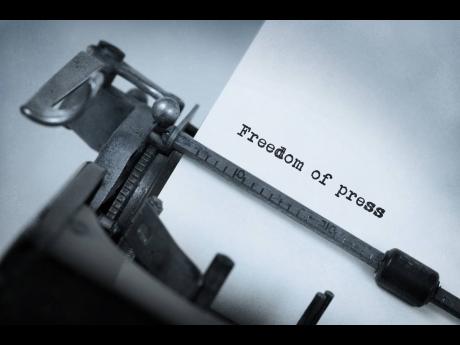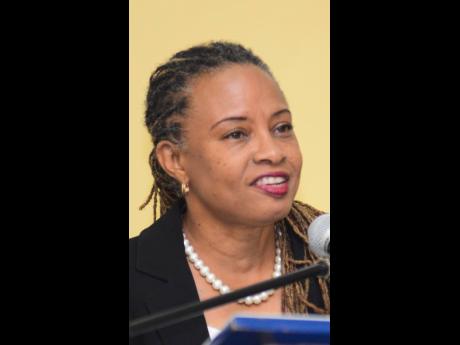Dionne Jackson Miller | Enshrine freedom of press in Jamaican Constitution
Imagine the Jamaican police raiding the offices of a media house, trying to find the source of a story about a senior cop! This was exactly the situation faced in 2020 by the Trinidad Express newspaper. However, the Trinidad Express had a powerful weapon with which to fight back. They had a constitutional right to freedom of the press. Jamaican media do not have the benefit of such a provision, and it’s high time we do.
Jamaica’s 2011 Charter of Fundamental Rights and Freedoms provides for the right to “freedom of expression” and the right to “seek, receive, distribute and disseminate information through any medium”. Jamaican parliamentarians apparently believed that should be enough for the Jamaican press. But if the freedom of expression banner is broad enough, why would countries like the United States (US) and Trinidad and Tobago have felt it necessary to enact a separate right to freedom of the press? In the United States, the First Amendment to the Constitution states that “Congress shall make no law … abridging freedom of speech, or of the press”. In Trinidad and Tobago, Section 4 (i) gives the right to freedom of thought and expression, while 4 (k) stipulates the right to freedom of the press.
STRONGER PROTECTION
A separate provision means stronger protection for the press. So why did Jamaica decide against enshrining freedom of the press in the Constitution? The Supreme Court in Tomlinson vs TVJ quoted the 1994 Report of the Constitutional Commission:
“While recognising the critical role played by the press in the preservation of democracy, by a majority decision we did not accept that the only or even the most effective way of providing the appropriate constitutional guarantee is by the use of the term ‘freedom of the press’.”
The court further quoted:
“Press literally means a printing house or newspaper establishment. Modern technology has demonstrated that there is unlimited scope for the development of new methods of expression and communication. It therefore requires a particularly liberal extension of the word press to cover all these new developments. Accordingly, we have preferred the use of the word media.”
It is puzzling that the Constitutional Commission was apparently unaware of the evolution of the word ‘press’ as an omnibus term for those involved in the practice of journalism. It is also strange that the commission would not have recognised the importance of consistent terminology in law. It cannot be assumed that a court will carve out of a general provision, specific protection for the press, when the legislators themselves did not single out that protection.
This point is beautifully illustrated in a recent case out of Trinidad and Tobago, One Caribbean Media & Trinidad Express vs AG of T&T.
POLICE RAID
On March 8, 2020, the Trinidad Express broke a story headlined ‘ACP flagged for suspicious activity… bank records deposits of close to $2m into over 15 personal accounts’. On March 11, the police raided the Exp ress with warrants authorising seizure of items for evidence of “tipping off”. Simply put, they wanted to find out who had leaked the story to the newspaper. In ruling the police search unlawful and unconstitutional, the court quoted from a 1990 case, T&T Newspaper Publishing Group Limited vs Central Bank of T&T & AG of T&T:
“Freedom of t he press includes freedom of thought & expression & vice versa; but, where each freedom is set out separately … freedom of the press must have a greater and more all-encompassing meaning than freedom of thought and expression.”
So as far back as 1990, the courts in Trinidad and Tobago recognised that a separate constitutional right of freedom of the press denoted stronger protection for the press. One can only wonder if this ruling had been brought to the attention of Jamaica’s Constitutional Commission!
The judge in the Trinidad Express case explained that:
“… the vital and necessary role engaged by the media does require that the right to press freedom must be treated as one which carries special importance.”
The judge went on:
“… the effecting of a search warrant upon a media house … cannot be equated to a situation where a search warrant is executed upon a private citizen given that any unjustified interference with press freedom can have a retrograde, reverberating and recessive impact upon the society as a whole.”
Let me be clear. I am not suggesting that either the United States or Trinidad and Tobago have a freer press than Jamaica. In fact, in the 2020 Global Press Freedom Index, Jamaica ranked 6th, Trinidad and Tobago ranked 36th, and the United States ranked 45th. But one of the dangers of living in Jamaica, with its history of press freedom, is that it’s easy to get complacent, and believe that the occupants of Jamaica House and Gordon House will always uphold a free press. If observing our powerful neighbour to the North for the past four years has taught us anything, it’s how quickly government policies can change, and how rapidly hostility to the press can escalate.
A situation such as the one faced by the Trinidad Express is not unthinkable. But here, we would not be able to depend on the right to freedom of the press. Let’s fix that.
Dionne Jackson Miller is a journalist and attorney-at-law, and a tutor in Constitutional Law at UWI, Mona. Send feedback to columns@gleanerjm.com


